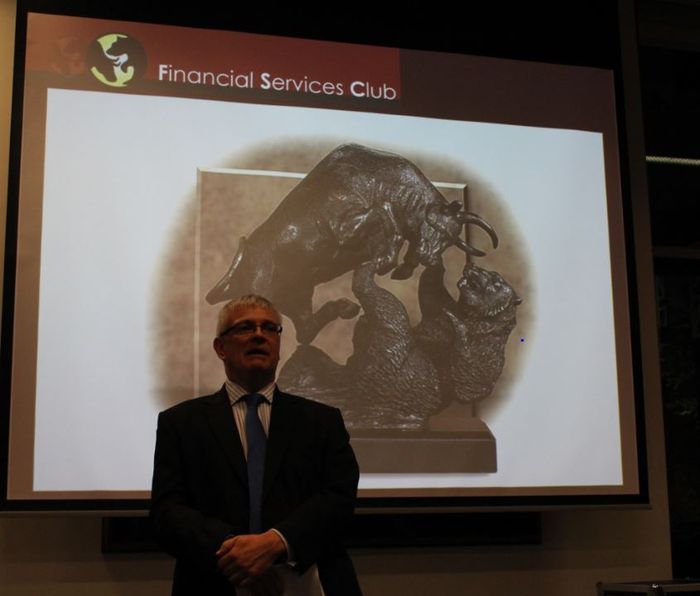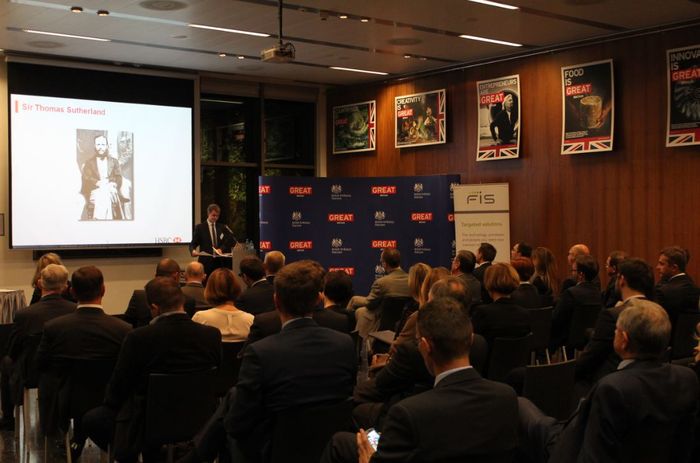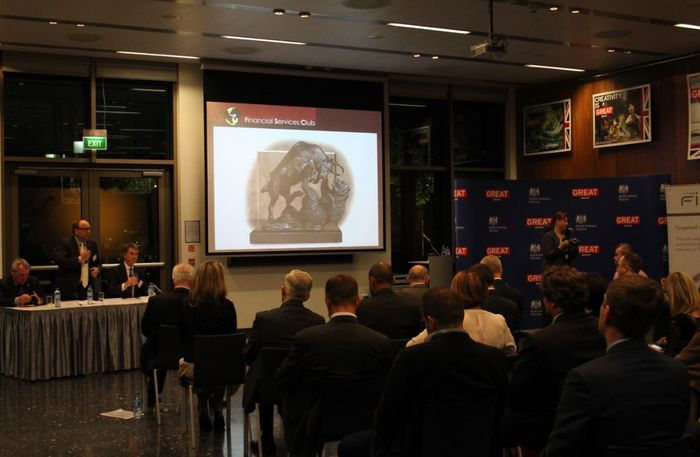
So it’s been another busy week with Financial Services Club meetings in London, Edinburgh and Warsaw. I’ll summarise each one over the next week, but will begin with our meeting in Warsaw which saw John Rendall, CEO of HSBC Polska, presenting his impressions of banking in Poland (see my blog from SIBOS for more background).
The meeting was held at the British Embassy and was kicked off by the British Ambassador to Poland, Robin Barnett, talking about the close ties between UK PLC and Poland.

Robin highlighted the impact of the financial crisis on regulations, and how the City and EU were working closely to create a well regulated sector that everyone could be proud of, as the Financial Services sector is critical to EU growth, stability and the Single Market. He then went on to talk about how Poland has moved well into exporting, and what a transformation there had been since his first visit to the country in 1982 and today.
John then built upon this view by starting his presentation using the World in 2050 report, produced by HSBC’s economists in 2012.
The report shows Poland’s economic strength remains stable as the 6th largest economy in Europe and the 25th largest economy in the world. By 2050, Poland will have an economy larger than Sweden (which falls from 18th to 38th), Belgium (down from 21 to 39) and Switzerland (20th falls to 29th). This is actually because Poland manages to compete on a global basis with the new economies that have emerged from the rest of the world. In fact, eighteen of the top thirty economies will be from Latin America, Asia, the Middle East and Africa in thirty-five years, as demonstrated by the fact that China has already outstripped America.
China, according to the International Monetary Fund, now has the largest economy in the world. Just over ten years ago, when Jim O’Neill of Goldman Sachs coined the BRIC acronym, the forecast was that China would achieve this by 2040 or thereabouts. It just shows how difficult these things are to forecast.

Equally, as John underscored, the projections for Poland and other European economies in 2050 will be severely impacted by demographic change. Poland’s working population is forecast to shrink 25% to 30% by 2050 due to families having less children resulting in an aging population. That may be tempered by the fact that Poland has the highest Catholic population of most European countries, but it is a factor in the future.
Having set the scene for Poland in the future, John then gave his impressions of working there, having taken over the bank’s country operations in 2011.
Before doing so, he did point out that, like many other banks (ING, Citi), HSBC has a shared service centre operation in Krakow with over 1,000 staff. The bank also sees Poland as an important country for its commercial and corporate banking services (HSBC shut its retail operations in 2009, as the global financial crisis hit).
One interesting fact I had not picked up is that HSBC is celebrating its 150th birthday next year, having been established by Sir Thomas Sutherland, a Scotsman, in 1865. Not bad for a new upstart bank to have achieved a market capitalisation today of over $150 billion, with coverage in 74 countries and 52 million customers.
Anyways, back to John’s comments about the country, he focused upon how Polish people are very dedicated and try to achieve the highest quality. That is why the bank has its shared service centre there. It’s not a cost factor, as there are cheaper markets than Poland to base the bank, but it is a cost and quality factor. For example, the Krakow operations are multilingual, offering corporate services globally and achieving quality standards higher than most of the bank’s global market operations.
Equally, Polish people are very direct. An attribute that I have also discovered. It is almost to the point of being rude, as we English try never to actually articulate what it is that is getting in the way. The Polish just call the elephant in the room and tell you to get over it. That’s good for getting things done, but it can be awkward for foreigners like John who has not been exposed to that cultural factor.
John continued to discuss these areas for a while, and then we went to open Q&A.

One question that was particularly interesting is that when Poland liberalised in 1989, 100% of the banking system was state-owned and run badly. During the 1990s, many overseas banks invested heavily in the banking system such that, by 2001, almost 40% of the financial market operations were owned by foreign banks.
Since then, as with HSBC, many overseas banks have been selling or closing non-strategic assets. This was demonstrated the other day when PKO bank acquired Nordea’s operations in Poland. This has resulted in Polish banking being run by a majority of domestic banks today. Over 70% of bank operations are run by Polish banks today, and the question put to John was whether more foreign banks would be leaving the country in his view such that, over time, Poland’s banking system would be dominated by a small number of domestic players.
John responded by saying that would not be the best way to go as we tried that in the UK and discovered that if you had just three or four big players, you had problems!
There were also two big laughs through the evening. The first was when John said what a delight it was to work in a country that explicitly decided not to use cheques. The second was when an audience member asked John: do you think that Poland should drop the zloty and join the Eurozone?
All in all, it was an interesting and insightful evening, finishing with exquisite canapés and wine (no beer or pizza here).
More on the other meetings tomorrow.
Chris M Skinner
Chris Skinner is best known as an independent commentator on the financial markets through his blog, TheFinanser.com, as author of the bestselling book Digital Bank, and Chair of the European networking forum the Financial Services Club. He has been voted one of the most influential people in banking by The Financial Brand (as well as one of the best blogs), a FinTech Titan (Next Bank), one of the Fintech Leaders you need to follow (City AM, Deluxe and Jax Finance), as well as one of the Top 40 most influential people in financial technology by the Wall Street Journal's Financial News. To learn more click here...

